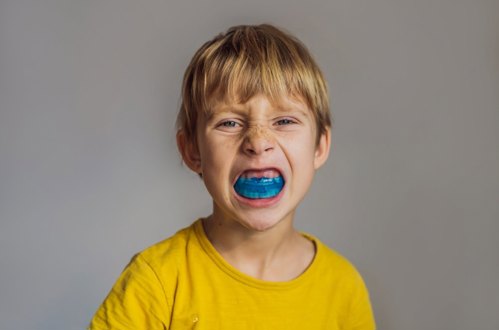
Anybody who happens to suffer with teeth grinding, bruxism, or similar dental issues, will know all too well just how painful and uncomfortable it can be.
Bruxism can cause a wide range of side effects and dental issues, yet by wearing specially designed night guards, known better as night guards or dental splints, you can noticeably reduce the severity of the grinding condition and get a proper night’s sleep in the process.
Wearing a night guard means that your teeth and dental implants can’t rub and grind against each other, and you can’t clench or put pressure on your jaw at night. They’re easy to wear, simple to clean, and if you get one custom made night guard by your dentist, they’re very comfortable and very effective.
They aren’t however, without their risks and side effects. Like any medical device, there are always risks and side effects which is why it’s so important to be aware of the potential night guards and braces side effects risks that wearing these devices can pose.
This article will discuss several dental night guard side effects and what you can do to avoid them.
First and foremost, if you find that your bite feels weird after wearing night guard products, jaw pain after wearing night guard products, or simply the fact that the device itself feels discomfort, chances are that you have a non-fit night guard.
Wasting money on a poorly fitting mouthguard will not only feel discomfort, it also affects your breathing, your speech, and causes jaw, oral or/and mouth pain as well which causes you to have an obstructive sleep at night time due to the sores or blisters on the gums, tongue, or other soft tissues in the mouth.
Most generic stock night guards or boil and bite dental splints will cause these issues because they haven’t been made exclusively for you. The easiest way to avoid these issues is simply to visit your dentist and have them create a custom mouth guard as this will provide a perfect fit and guards to your teeth and mouth.
Though less common, another night guard's side effects risk that you should be aware of is a risk of allergic reactions.
Good quality mouthguards are made from sturdy, high quality materials such as acrylic resin, which are less likely to cause allergic reactions. Cheaper, poorer quality mouth guards however, may add materials such as latex, and certain types of plastics, that could trigger an allergic reaction.
The easiest way to avoid an allergic reaction to dental night guard or oral appliances is to consult with your dentist first. That way you can inform them of any allergies you may have, plus they can search and check your previous dental and medical records to prevent you from getting side effects like allergies.
Another rare, but possible risk associated with wearing a night guard is tooth decay.
If you fail to clean and sanitise your night guard regularly, you’re at risk of a bacterial infection from night guard products.
Failing to clean and sanitise your night guard can cause bacteria to build and accumulate which could then lead to a bacterial infection from night guard and tooth decay.
Be sure to rinse your mouthguard or oral appliance after every use, give it a thorough clean once a week, and always store it completely dry, in a suitable and sterile container.

Another reason why it is not recommended that you purchase a cheap, stock night guard that without safety insurance is because of the potential choking hazards.
Though very rare, there have been instances where people have sadly choked and got sleep apnea during night time as a result of non-fit night guards. Again, the easiest way to avoid this is to have your dentist make a custom night guard for you, as that way it will stay in place at all times.

As we keep emphasising, in order for you to guarantee maximum levels of comfort, a perfect fit, and a night guard that actually does the job that it is supposed to do, you should always speak to your dentist.
If you experience jaw pain after wearing a night guard, or are simply looking for tips for sleeping with a mouth guard, speaking to your dentist will help ease your concerns and show you everything you need to know about a night guard.
Dentists will customise a night guard specifically for your mouth, which in turn will help you to avoid night guards side effect issues and to have a good night. Not only that, but they will also help to determine the best type of night guard for your specific dental problem, and personal circumstances.